Top 9 Ethiopia Culture, Customs and Etiquette
Ethiopians are very proud of their culture, identity, and country. Avoid criticizing their cultural lifestyle, especially their brand of Christianity (Oriental ... read more...Orthodox). Rather than argue about the merits of Orthodoxy or Islam, it's best to ask friends to explain their customs, festivals, and beliefs and to listen with respect. Let’s take a quick look at Ethiopian culture, customs, and etiquette.
-
Greetings are very important in Ethiopia. It is expected that people acknowledge one another courteously, even if they do not speak the same language. It is rude to rush through a greeting or pass by someone without acknowledging them, even briefly. Greet the eldest people first out of respect. It is common to shake hands to greet strangers, using the right hand or both hands. Make eye contact during a handshake. However, this should be the only assertive aspect of the interaction. People generally hold one another’s hands quite lightly.
Men often greet other men that are close friends by pulling one another into an embrace (whilst still shaking hands) and using their other hand to rub the person’s back. Close friends often kiss one another on the cheek around three times. If it has been a long time since people have met, they may even kiss four or five times and embrace for longer. Some Muslims may prefer not to embrace members of the opposite gender unless they are a close family member. Therefore, men should wait until a woman extends her hand first before extending his own hand for a handshake.
The elderly are greeted with significant respect. Some may kiss their hands to greet them, while others may give a small bow or lower their head. The elderly often kiss children on the forehead, and may receive a kiss on their knee or leg in return. Use people’s titles to address them until invited to move on to a casual basis. Common titles include ‘Ato’ (Mr), ‘Woizerit’ (Miss) and ‘Woizero’ (Mrs).
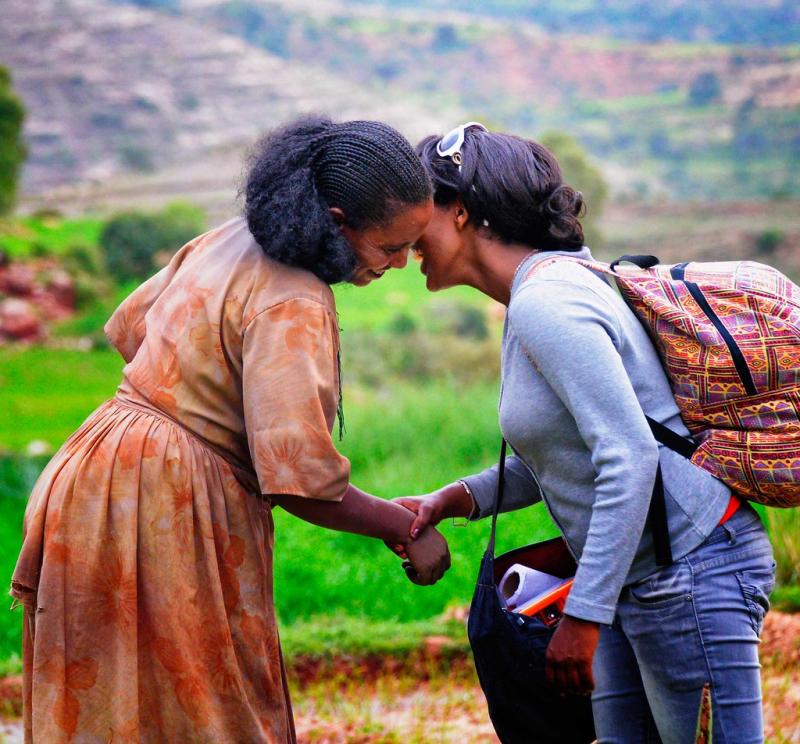
https://www.flickr.com/ -
You are almost always expected to eat when you visit someone’s house. It is considered rude to decline an offer to eat. If you cannot accept food for a legitimate reason, decline it politely with a bow to show gratitude. It is rude to eat in front of people without offering them any food, especially guests. It is important to wash your hands before a meal is served. Sometimes a bowl will be brought to guests so they can wash their hands at the table. Women should offer to help the female host prepare and clean up after the meal.
People are served in order of their age or status, with the eldest or esteemed guests served first. Hosts may not sit down until their guests have been seated. Wait for people to bless the food with a prayer before you start eating. All guests usually help themselves to food from a shared platter, eating directly from the dish instead of from separate plates. Ethiopian food generally does not require utensils to eat. Everyone normally uses their right hand to serve themselves from a dish, using their fingers to scoop the food. Never pass or eat food with your left hand alone. People often use injera as a scoop. This is a sponge-like pancake that is often used to soak up the remains of food, like a tortilla. It is eaten with almost everything. If given utensils, it is important to hold them towards the end so your fingers do not touch the food.
Guests may be hand-fed the tastiest parts of meals. This process is called ‘Gursha’ and is done out of respect. The host or another person seated at the meal will place the food in the guest’s mouth with their hands. It is polite to smile and accept the offering. It is rude to rush a meal and leave immediately after. In northern Ethiopia, it is polite to leave a little bit of food on your plate to indicate that the host has provided adequately. However, this custom may differ in other regions.
It is common for people to eat similar ingredients for breakfast (kuris), lunch (mesa) and dinner (erat). Common foods include spicy meat stew (wat), bread mixed with sauce (firfir), spaghetti or roasted bread (kita). Lamb, goat and fowl are commonly eaten. However, turkey, pork and ham are not as common. Many Ethiopian Orthodox Christians do not consume any meat or animal products during days of fasting, which includes every Wednesday and Friday. If you are unclear about whether a guest at your meal is fasting or not, it is a good idea to provide a vegan-based option for them to eat. Fish is not prohibited. Ethiopian Muslims do not consume pork or alcohol. Some Pentecostal Christians refrain from drinking alcohol.
https://www.youtube.com/ 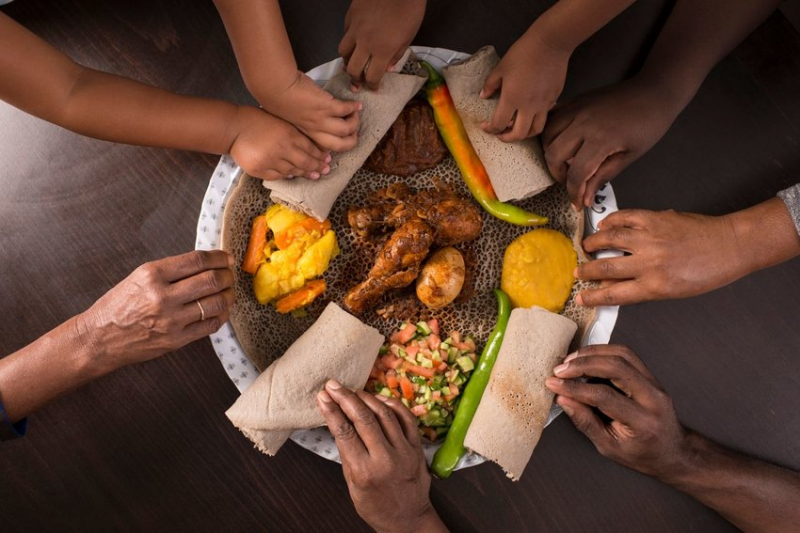
https://stage.triptrivia.com/ -
One of Ethiopia's cultures, customs, and etiquette, regardless of their ethnicity, is coffee. Coffee is Ethiopia's national drink, and it is served and consumed during the ceremony. The entire procedure should take at least one hour. Coffee is served while sitting on pillows or on a grass-and-flower-strewn floor, with frankincense perfuming the air. In front of guests, beans are washed, roasted, and ground. Typically, the person presiding over the coffee ritual is a young lady who has been trained in the nuances of the ceremony for years.
Sugar will be placed into the coffee cup, then coffee and water will be poured over the sugar. (The coffee pot is called a “Jebena.”) In some rural homes, coffee is served with salt instead of sugar. The guest-of-honor or the eldest person is served first. The coffee should first be inhaled, then sipped slowly.
Traditionally, three rounds of coffee are served, each more diluted than the previous: "abol" (also "awol"), "tona," and "baraka," which means "to be blessed." The three cups of coffee are thought to represent a gradual spiritual transformation. Do not refuse coffee—unless for medical or religious reasons, for example. A guest invited to a coffee ceremony (which, in some families, occurs up to three times per day) should present the host or hostess with a simple gift—such as sugar, pastries, or candies.
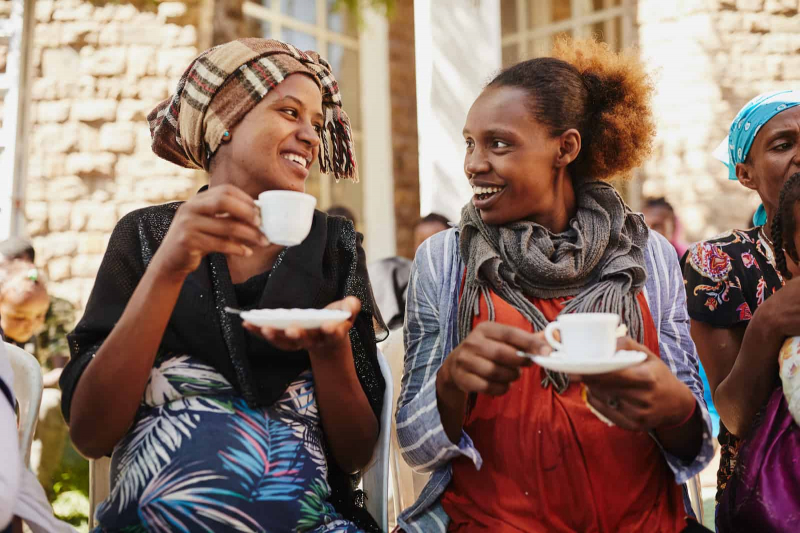
https://blog.compassion.com/ 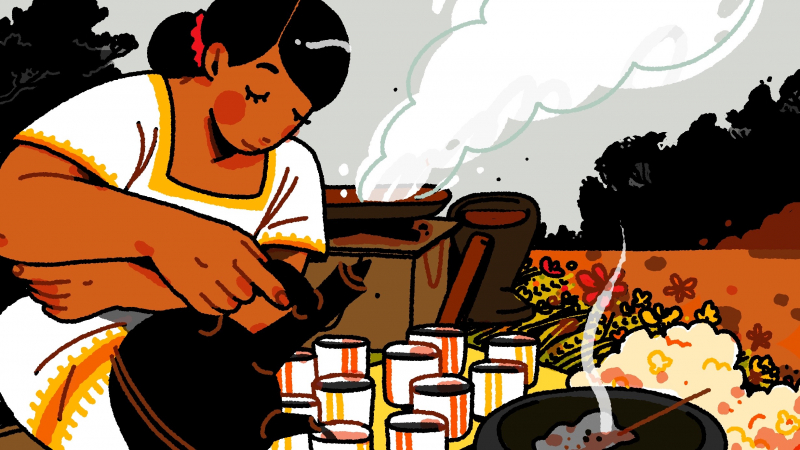
https://theculturetrip.com/ -
Buhe is also an interesting thing you should know when learning about Ethiopian culture, customs, and etiquette. As the rainy season is nearing its end and the Ethiopian New Year is right around the corner, the faithful of the Ethiopian Orthodox Tewahedo Church celebrate the unique outdoor religious and cultural festival, Buhe, on the 13th of the Ethiopian month Nehase (August 19th ).
Buhe, also known as the Festival of Debre Tabor or the Festival of Transfiguration, is one of the old age's annual religious and cultural festivals. The event has been observed by the Ethiopian Orthodox Tewahdo Church faithful to commemorate the wondrous event that came about at Tabor Mountain and glorify God.
Buhe is one of the ancient religious and cultural festivals. Observations include people of the neighborhood tying a bundle of sticks together to make a chibo and setting it on fire while singing songs. The main song is called "Hoya Hoye", with one singer singing while the others follow in a rhythmic way. It involves young boys singing songs of praise outside of people's homes in exchange for fresh bread called mulmul. The boys then bless the family of the home for the following year.
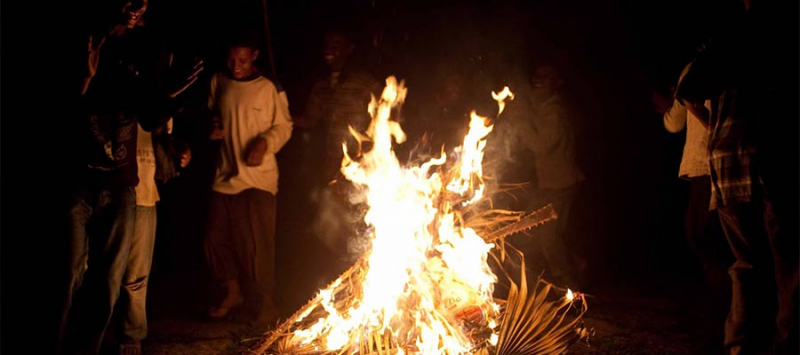
https://guidetoethiopia.com/i https://www.youtube.com/ -
Enkutatash is one of the Ethiopian cultures, customs, and etiquette that you should know. The Ethiopian New Year, Enkutatash, means the "gift of jewels". Legend has it that King Solomon of Jerusalem gave the Queen of Sheba jewels during her famous visit to Jerusalem some 3,000 years ago. Her return to Ethiopia after receiving the gift coincided with the New Year celebration in September, and hence the name Enkutatash came to be.
One of the reasons Ethiopians celebrate New Year during this month is that the number of daylight hours and nighttime hours happen to be exactly equal in every part of the globe once every September, which is one of the reasons During this time of the year, the Sun and the Moon that are used to count time each have 12 hours before setting. The second reason is derived from the Bible, which says that the creation of the heavens and the earth took place in September.
Ethiopians believe that the month of September has different signs that explain why it should be celebrated as the beginning of a new year. Blooming flowers, sunny days, and generally pleasant weather reign during this month. It is a time when people leave the rainy, foggy, and thunderous months of Ethiopia’s winter period behind and move on to better days.
https://www.youtube.com/ https://www.youtube.com/ -
The Ethiopian national dish is called wat. It is a hot, spicy stew accompanied by injera (a traditional large spongy pancake made of teff flour and water). Teff is unique to the country and is grown in the Ethiopian highlands. There are many varieties of wat, e.g. chicken, beef, lamb, vegetables, lentils, and ground split peas stewed with a hot spice called berbere.
Berbere is made of dried red hot peppers, herbs, spices, dried onions, dried garlic, and salt. Wat is served by placing it on top of the injera, which is served in a mesob (large basket tray). The food is eaten with your fingers by tearing off a piece of injera and dipping it in the wat.
Ethiopian Orthodox Tewahedo Christians do not eat meat and dairy products (i.e. eggs, butter, milk, and cheese) on Wednesdays and Fridays except the 50 days between Easter and Pentecost, the Fast of the Prophets, the Fast of Nineveh, Lent, the Fast of the Apostles, and the fast of the Holy Virgin Mary. According to the Ethiopian Orthodox Tewahedo Church belief, the faithful must abstain from eating meat and dairy products to attain forgiveness of sins committed during the year and undergo a rigorous schedule of prayers and atonement.
Vegetarian meals such as lentils, ground split peas, grains, fruit, and varieties of vegetable stew accompanied by injera and/or bread are only eaten during fasting days. Meat and dairy products are only eaten on feasting days, i.e., Christmas, Epiphany, Easter, and all other times. Ethiopian Orthodox Tewahedo Christians. Jews and Muslims do not eat pork as it is forbidden by their religious beliefs.
https://www.youtube.com/ https://www.youtube.com/ -
Visits are important to building relationships in Ethiopia. You can expect people to be extremely welcoming and hospitable. In Ethiopia, it is normal for friends and family to visit each other's houses without giving prior notice, although people in urban areas may pre-arrange visits. It is common to receive an invitation to socialise over the evening. Be mindful that an Ethiopian person’s home is also their private place for prayer. Therefore, it is important to be clean and respectful. Remove your shoes before entering someone's home, any church or mosques.
If the guest arrives during a family mealtime, Ethiopians will usually invite them to join the meal. It is best to bring a gift when visiting someone’s home for the first time. Guests are always served something to drink upon arrival, usually coffee or occasionally tea. Coffee drinking is a very social and familial activity. It often allows hosts to introduce their guests to neighbours and family. Men and women usually socialise freely together. However, in some Muslim homes, the two genders may separate and have different discussions. Expect any visit to last at least an hour, if not multiple hours. It takes an hour at minimum just to serve coffee in the traditional manner.

https://www.google.com/ 
https://www.google.com/ -
Another unique feature of Ethiopian culture is a simple style of painting that is found in every church and other important locations. This style seems to have remained almost unchanged for centuries. Figures are drawn in two dimensions, almost cartoon-like in their direct and simplistic portrayal, with strong colors and clear lines. The almond-shaped eyes are a particularly appealing characteristic.
Church painting in Ethiopia serves a very real purpose, with both biblical and more localized religious stories being portrayed clearly and simply to inform illiterate people of their traditions and heritage. European medieval imagery is a clear comparison here.
One modern name is clearly prominent in the world of Ethiopian painting today. Afework Tekle has an international reputation as an artist of immense standing. His works, though clearly based on an Ethiopian tradition, have a new and creative dynamism that is immediately of universal appeal. His vibrant paintings, many of them on very large canvases, are to be seen throughout Ethiopia in museums and galleries as well as on postage stamps and postcards.
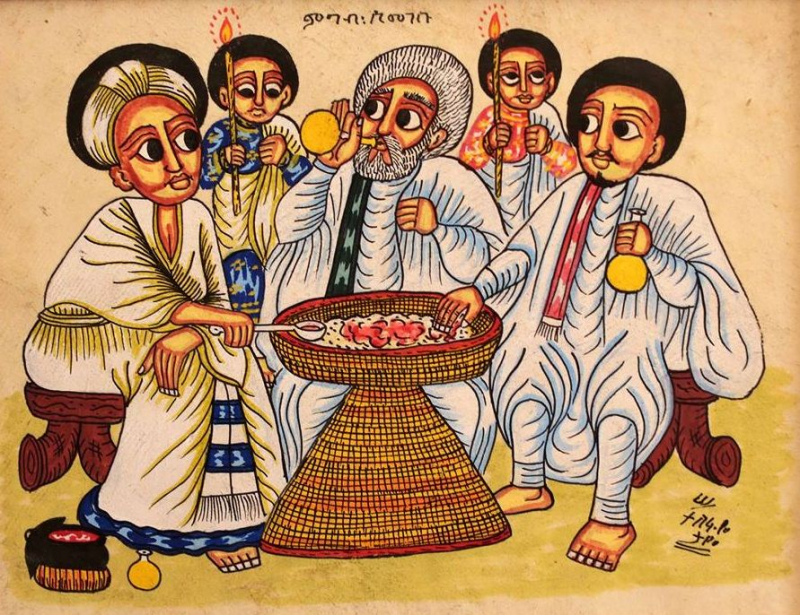
https://www.google.com/ 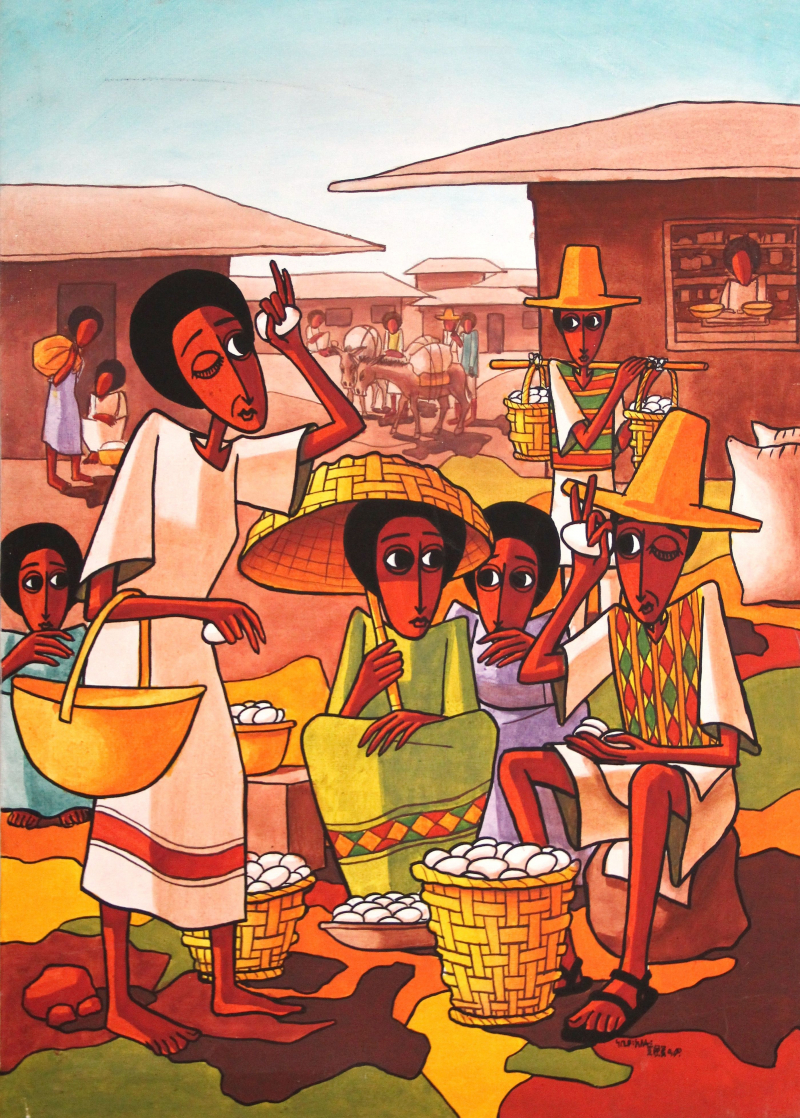
https://www.google.com/ -
Among Ethiopia's culture, customs, and etiquette are music and dance. St. Yared is the Ethiopian patron saint of church music, and in every church, music serves to give atmosphere to the ritual and to heighten the personal experience. Every church has its own drums, covered with decorated material, and its own sistra, metal rattles that date back hundreds of years. These accompany the chanting of the priests, along with the beating of the prayer sticks and the clapping of hands.
Out in the community, musical instruments play a social and entertaining role. The single-stringed Masenko is played by minstrels who sing of the life around them and invent calypso-like, topical verses on the spot. The Kirar is a lyre-like plucked instrument with 5 or 6 strings, while the Begenna is a portable harp. Up in the hills, boys are shepherds, looking after cattle and sheep whilst playing on the Washint, a simple reed flute played with a single hand.
The Ethiopian people know and love their folk songs. Singing is high-pitched and shrill and is frequently accompanied by exciting ululation, especially at weddings and other joyful occasions. In addition to more traditional styles, Ethiopians also listen to popular music, where the country boasts a whole host of contemporary artists, some of whom are internationally recognized, such as Gigi. Mainstream music from the West has also infiltrated Ethiopian culture where you can hear Lady Gaga and Justin Bieber alongside Ethiopia’s man of the moment, Teddy Afro on the radio!
No joyous occasion passes without the Ethiopians indulging in their unique form of dancing. Each ethnic group has its own individual style of dancing (and a costume that accompanies it) to match its own particular form of music. In the north of Ethiopia, people dance mainly with their upper bodies, moving their heads, necks, shoulders, and chests to the rhythm. As you move further down the country, however, gradually more of the lower body is incorporated into the dance, for example, the waist and legs.
https://www.youtube.com/ https://www.youtube.com/






























